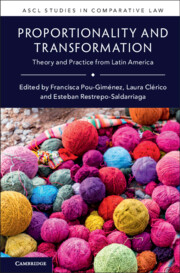Book contents
- Proportionality and Transformation
- Ascl Studies in Comparative Law
- Proportionality and Transformation
- Copyright page
- Contents
- Editors
- Contributors
- Acknowledgments
- Introduction
- Part I Proportionality and Processes of Constitutionalization
- Part II Proportionality in Social Rights and Equality-Based Adjudication
- 6 Socioeconomic Rights in the Colombian Constitutional Jurisprudence
- 7 Progressive Realization, Nonretrogression and Maximum of Available Resources
- 8 The Use of Proportionality by the Inter-American Court in Equality and Nondiscrimination Cases
- 9 Transformation and Its Limits
- Part III Proportionality, between Transformation and the Status Quo
- Index
9 - Transformation and Its Limits
Proportionality, Courts and Socioeconomic Rights in Brazil
from Part II - Proportionality in Social Rights and Equality-Based Adjudication
Published online by Cambridge University Press: 27 October 2022
- Proportionality and Transformation
- Ascl Studies in Comparative Law
- Proportionality and Transformation
- Copyright page
- Contents
- Editors
- Contributors
- Acknowledgments
- Introduction
- Part I Proportionality and Processes of Constitutionalization
- Part II Proportionality in Social Rights and Equality-Based Adjudication
- 6 Socioeconomic Rights in the Colombian Constitutional Jurisprudence
- 7 Progressive Realization, Nonretrogression and Maximum of Available Resources
- 8 The Use of Proportionality by the Inter-American Court in Equality and Nondiscrimination Cases
- 9 Transformation and Its Limits
- Part III Proportionality, between Transformation and the Status Quo
- Index
Summary
This chapter aims to analyze one aspect of the proportionality test in the case law of the Brazilian Supreme Court: its use as a tool for deciding cases involving socioeconomic rights. If these rights are one of the core elements of a transformative constitution, using the proportionality test to decide these cases raises the question of its transformative potential. We argue that there are several reasons for concluding that proportionality does not play a transformative role in Brazil. Some of these reasons are related to the general debate on the transformative potential of litigation; others are related to how the Brazilian Supreme Court uses the proportionality test, which could be summarized as follows: First, the Court has often used the proportionality test as a rhetorical device only; second, due to peculiarities of the decision-making process of the Court, proportionality has never been employed by the majority of its judges; third, in the realm of socioeconomic rights, the role of proportionality has been frequently undermined by other types of reasoning.
Keywords
- Type
- Chapter
- Information
- Proportionality and TransformationTheory and Practice from Latin America, pp. 205 - 220Publisher: Cambridge University PressPrint publication year: 2022

